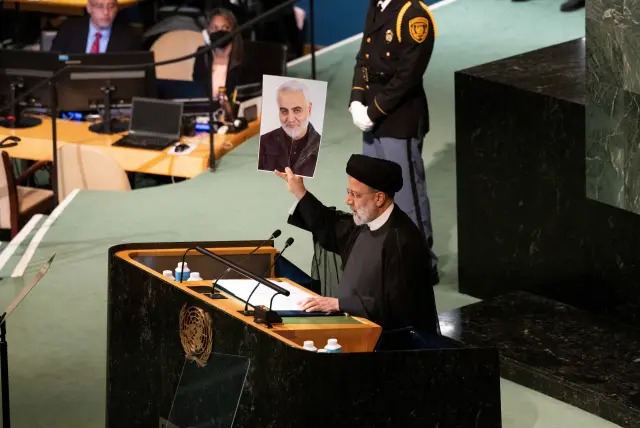In a dramatic turn of events at the United Nations General Assembly in New York, Israel’s Ambassador to the UN, Gilad Erdan, was forcibly removed from the assembly hall after staging a one-man protest during Iranian President Ebrahim Raisi’s speech. The incident unfolded as Erdan raised a powerful banner reading, “Iranian women deserve freedom now,” igniting a fiery clash of diplomatic tensions. This unprecedented act of defiance has sent shockwaves throughout the international community and further deepened the longstanding animosity between Israel and Iran.
Erdan’s Bold Protest Shakes UN Assembly
Erdan’s bold protest took place during President Raisi’s speech at the opening of the 78th session of the United Nations General Assembly, an event attended by more than 140 world leaders and representatives. As the Iranian President began his address, Erdan unveiled his message of solidarity with Iranian women, holding a picture of Mahsa Amini, a 22-year-old Iranian woman whose tragic death in police custody one year ago had sparked nationwide protests in Iran.
Erdan’s message was crystal clear, denouncing the Iranian regime’s oppressive policies, particularly its treatment of women. His act resonated not only with Israeli sentiments but also with those advocating for human rights worldwide. It served as a stark reminder of the ongoing struggle for justice in Iran, amplifying the voice of dissent against the Tehran government.
UN Security Forces Escort Erdan Out Amid Global Attention
As Gilad Erdan unfurled his banner and voiced his condemnation of the Iranian regime, a video clip of the incident quickly spread across social media platforms, drawing global attention. In the video, UN security forces can be seen escorting the Israeli envoy out of the assembly hall, effectively silencing his protest.
This expulsion, witnessed by leaders and diplomats from around the world, underscores the complex web of international relations and the tension that persists between Israel and Iran. Erdan’s actions, though brief, have highlighted the divisive nature of discussions surrounding Iran’s leadership and its human rights record on the world stage.
Israel and Iran’s Ongoing Hostility
The longstanding enmity between Israel and Iran, dating back to the 1979 Iranian revolution, has been punctuated by frequent accusations of sabotage activities and mutual distrust. Erdan’s audacious protest further exacerbates this already fragile relationship, prompting concerns about the repercussions it may have in the future.
Both nations have utilized the UN General Assembly as a platform to advance their respective agendas and criticize each other. Erdan’s actions reflect Israel’s determination to shed light on what it perceives as moral distortions within the UN and to continue advocating for its stance against Iran’s policies.
In a statement following his removal, Erdan declared, “I will never stop fighting for the truth and I will always expose the UN’s moral distortions.” His words serve as a stark reminder of the complexities and conflicts that persist within the international arena, and the deep-seated convictions that drive nations to take extraordinary measures to make their voices heard.
















